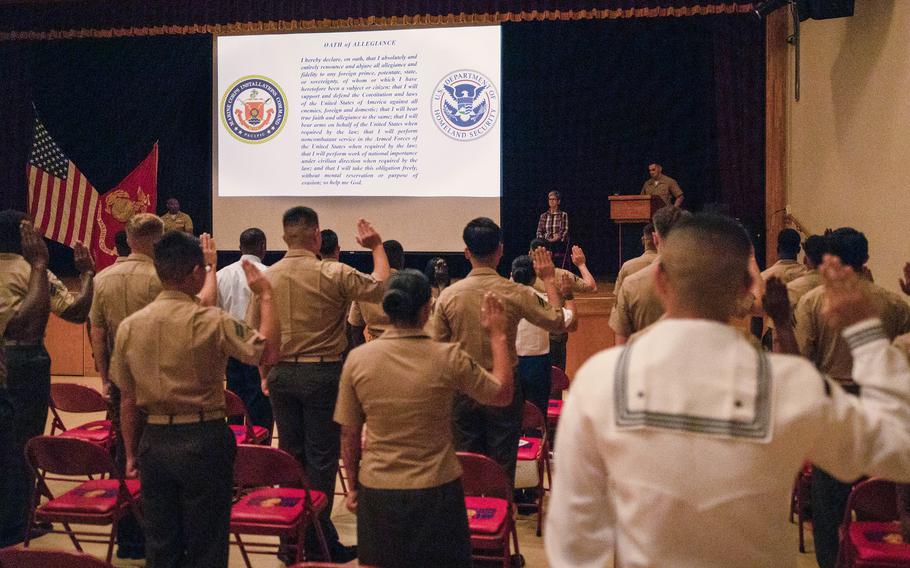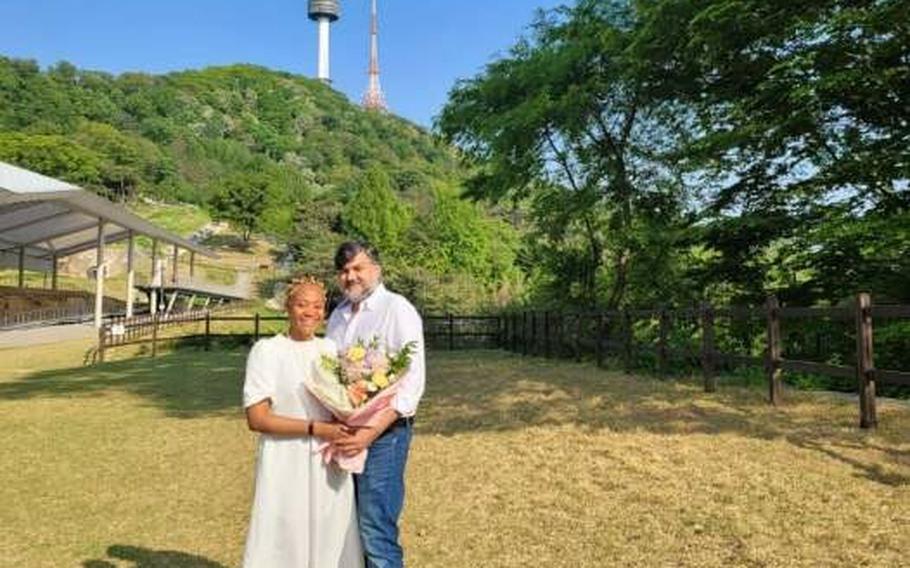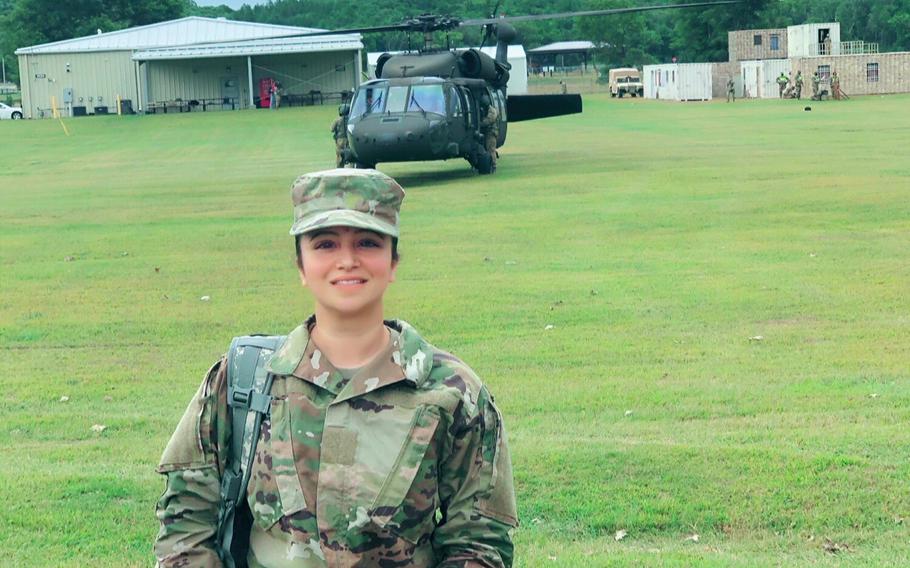
U.S. service members raise their right hand during a naturalization ceremony hosted at the Camp Foster Community Center on Okinawa on April 25, 2022. (Jonathan Beauchamp/U.S. Marine Corps)
Col. Junel Jeffrey-Kim has spent 17 of her 23 years in the Army overseas.
She had always been cautious about relationships with men from other countries because she didn’t want the stress of a long-distance relationship and the challenges it could create, she said. But in 2017, on her second tour to Korea, she met Rana Kim.
The two broke up when Jeffrey-Kim returned to U.S. after two years in Korea, but later reconnected and were soon engaged.
She began to file paperwork in April to bring Kim to the U.S. as immigration resources afforded to troops were being cut. She quickly found herself in a system inundated in which an increasing number of service members were relying on a shrinking amount of resources.
It created long wait times, ineffective responses and bad information.
For the 45-year-old Jeffrey-Kim, it’s meant months of delays, hundreds of dollars lost to the system, and a slow draining of hope for her future family.
“I love my job and I love working for the Army,” she said. “If I get to the end of my life, and I have not had a family, but I’ve had this wonderful career, none of that will matter.”

Col. Junel Jeffrey-Kim married her husband, Rana Kim, of Korea, in May. In trying to get approval for him to move to her duty station in Washington, Jeffrey-Kim has called a military help line run by U.S. Citizenship and Immigration Services only to receive bad information. This led to a delay in filing her application and the loss of hundreds of dollars. (Photo provided by Junel Jeffrey-Kim)
U.S. Citizenship and Immigration Services launched in 2007 a phone- and email-based support center for troops whose immigration cases often can be complicated by deployments, lengthy training rotations or other overseas assignments. But about 10 years later, the agency dropped online appointment scheduling for all immigration cases, citing misuse, and funneled those needs through the phone lines.
A few months ago, immigration services stopped responding to the military-only email account and switched its phone line to an automated answering service instead of a live agent.
Phone calls have more than doubled in the last year based on information from the Government Accountability Office and USCIS – from 47,000 to 138,000 – and some troops and their attorneys said they are now unable to get through to make appointments or access accurate information to move their cases forward.
“If I'm not able to just talk to a help desk, I don't know how they're handling the case,” said Senior Airman Sakshi Hans, who has been calling the help line for an update on her mother’s green card case, which has exceeded the projected wait time by four months. “I need to go somewhere because I’m on orders, you can at least help me to take care of my family. That is something every person wants.”
The degradation of the military help line is part of an increasingly chaotic, understaffed, under-resourced Department of Homeland Security that cannot keep up with the demand for its services, according to several reports from think tanks and other organizations that studied immigration. As of June, immigration services has a backlog of nearly 8.8 million cases, according to the CATO Institute, a libertarian think tank based in Washington.
That’s up nearly 3 million from four years ago. The October report blames the increasing backlogs on inefficient systems and an inability to implement new policies meant to improve conditions.
Agency officials declined to answer questions about the increase in call volume or how it is managing the heavier workload. Officials also declined questions about whether calls to the military line flow to a specialized call center, or if the calls are routed to its general contact center where agents are less versed on the specific needs of troops.
There are also special circumstances, such as a pending deployment, that require USCIS expedite a service member’s case.
“The existence of the military help line has helped so many people when it existed with the email system and when there was actually somebody that would answer the phone. It just relieved so much stress and it solved so many problems,” said Margaret Stock, an Alaska-based immigration attorney and retired Army Reserve lieutenant colonel who has worked extensively on military cases. “It's not solving problems and relieving stress anymore. It's creating more stress.”
In fiscal 2022, Congress infused USCIS with $275 million to put a dent in its backlog of cases – most of which are 1.7 million pending cases to sponsor a family member’s green card, according to a November report from the Migration Policy Institute. However, USCIS is still working to hire staffing, agency officials have said.
“USCIS’s ability to quickly staff up will likewise be key in getting the agency back on track, although hiring and training procedures are slow and the effects of new employees might not be felt for months,” the report stated.
The impact on families
Jeffrey-Kim first filed a petition in April to bring her Korean fiancé to Washington, D.C., where she is stationed. While visiting her husband a month later, the two decided to marry.
She called the USCIS military help line first to make certain the marriage wouldn’t negatively affect the application. It would help, she said she was told by the agency. All she needed to do was send her marriage license with new paperwork for a foreign relative, which would replace the previous application. The $535 fee would be waived because she had already paid it for the first application, the agent told her.
The application was swiftly rejected for lack of payment, Jeffrey-Kim said. She called back and this time was told USCIS would need to process a refund for the fiancé application.
On a third call, Jeffrey-Kim said she learned the refund had been processed for the wrong case. This agent offered to expedite the request because of all the misinformation that Jeffrey-Kim had received.
The expedited request was denied, and the final submission of her application delayed by months.
“It's like a game of hide the answers. If only you knew that was a part of it, then you could play,” she said.
All the while, Jeffrey-Kim has been trying to coordinate fertility treatments at Walter Reed National Military Medical Center in Bethesda, Md., so the couple can start a family.
“Everywhere I've been asked to go for the Army, I go. I have a wonderful career, and I love my job. This is the one thing I've asked of our nation. Can you please allow me to have a family? That's it. I don't want anything else,” she said. “I will keep working. I will do whatever, but this is the one thing I want. For one time, I don't want to be alone.”
Jeffrey-Kim filed two complaints with the Citizenship and Immigration Services ombudsman in early September and waited more than two months to hear back.
“They just said they can't help me - with anything. They said they're sorry about my getting the wrong information and saw my legitimate issues, but there's nothing they can do about it. I have given up hope in USCIS,” she said.
The ombudsman’s office said it has received 133 requests in the past five years in which the person indicated the issue was because of the military help line. The average response time to military cases was 19 days, while it took 45 days in nonmilitary cases, according to the office.
Removing obstacles
USCIS created the military help line in 2007 from legislation enacted after the death of Army Reserve Spc. Kendall Frederick.
The 21-year-old Maryland resident was born in Trinidad, and had been working to get his citizenship for more than a year when he was killed by a roadside bomb in Iraq in October 2005. He had left his base to get his fingerprints made for his citizenship application for the second time, according to a December 2005 report in The Baltimore Sun.
The late Rep. Elijah Cummings, D-Md., said at the time that Frederick’s case highlighted the obstacles in the citizenship process that were unfair to service members. The legislation in Frederick’s honor was designed to reduce those challenges through government agency coordination and provided the phone line as a resource.
The 2007 launch included an after-hours email address – a crucial line of support for those stationed overseas.
Common reasons for calling the help line include scheduling appointments, submitting an expedited request, updating personal information, applying for naturalization, replacing a green card, creating an online account, getting a case update, and locating a receipt number, according to USCIS.
About 3% of service members are noncitizens, Rep. Zoe Lofgren, D-Calif., chairwoman of the House Judiciary Committee’s subpanel on immigration and citizenship, said during a June hearing on immigrant military members and veterans.
That’s about 45,000 immigrant troops, according to Rep. Jerrold Nadler, D-N.Y., chairman of the Judiciary Committee.
“Every day great immigrant service members risk their lives in support of our country. We rely on them to keep our nation safe and to protect U.S. global interests. In return, we must honor their sacrifices by supporting them and their families, and by giving them every opportunity to become U.S. citizens if they so desire,” he said during the hearing.
Military naturalizations have declined 44% since former President Donald Trump’s administration, Nadler said. When President Joe Biden took office, he asked the departments of Defense, Homeland Security and Veterans Affairs to work together to improve the process for troops to become citizens. The departments formed the Immigrant Military Members and Veterans Initiative and built an informational website that includes the USCIS military help line as a point of contact.
Stock said she’s been disappointed to see that despite Biden’s request, USCIS eliminated the email address and enabled the automated answering service. Those changes came days after Debra Rogers, the Department of Homeland Security’s director of the new immigration initiative, sat before the House committee.
When the trouble began
In late 2018, the USCIS announced the removal of an online scheduling option to make an Info Pass appointment, which is required to go in-person to an agency office. Troops and attorneys now must call to request the appointment, then wait for a call back.
Jonelle Ocloo, an immigration attorney in Maryland, said the change has been “a nightmare.”
“Before with Info Pass, you had the freedom to schedule your own appointment,” she said. “Yes, there was frustration, because a lot of times all the appointments would be booked and you couldn't get an appointment. It was just a matter of try, try, try.”
Stock said she recently had military clients move duty stations, change their address, and months later receive an automated appointment at an office near their old address. With Info Pass discontinued, Stock spent about 90 minutes on the phone to get the appointment rescheduled. However, the agent once again booked it at the old location.
In another instance, Stock’s client contracted coronavirus and needed to reschedule an interview appointment. Stock said the agent put her on hold, then hung up after about five minutes, leaving her to wonder whether the request had been processed. This led Stock to send an urgent letter to USCIS in hopes that the agency didn’t close the case for abandonment.
The USCIS in July also discontinued an email address associated with the military help line. It was helpful for those troops stationed overseas because the phone line only operates from 8 a.m. to 6 p.m. EST, Monday through Friday. Troops stationed in Korea must call between 10 p.m. and 8 a.m. local time.
“They have reduced their customer service and that increases the stress on everyone in the system,” Stock said.
She volunteers with the American Immigration Lawyers Association’s Military Assistance Program, which is now receiving more help requests than its volunteers can manage.
“A lot of it is stuff that used to get solved with people being able to get through to a live human at the agency who knew how to handle a problem. But people can't get through anymore, so they can't get their problems fixed. Now they're having to reach out to private lawyers, which increases the cost to everybody,” Stock said. “I never used to deal with problems like changing appointments. People could do that on their own. They didn’t have to call me about it.”
The USCIS declined to offer an official to discuss the military help line. Matthew Bourke, spokesman for the USCIS, said the agency is “committed to creating a customer experience that is simple, seamless, and secure, while maintaining the integrity of our immigration system.”
The magic word
“The thing that is so upsetting is the system was working for years, and they just broke it,” Stock said.
She now advises her military clients to repeat the magic word “military” to the automated phone system so they can get a person on the line – though they’ve already called a number that is exclusively for service members.
Stars and Stripes called the help line Dec. 1. A live agent answered within about four minutes, and he said he is tasked with answering calls from the general public hotline and the military help line.
“Military members need a special line,” Ocloo said. “They may have questions that an ordinary customer service contractor cannot answer. You actually need someone who is versed in the typical issues with service members and their families. You really do have to have a military hotline.”
Hans, who called the line to get an update on her mother’s green card, said it took her 10 tries to get through the military phone line. Even as she said “military” into the phone, the line would just hang up on her. Once she got through, the agent told her to wait four weeks, and call back if nothing has changed on the online system.
Hans, 39, previously served in the Army, where she was able to attain her own U.S. citizenship. In July, she enlisted in the Air Force Reserve in Ohio to fulfill her goal of working in intelligence – a job that she couldn’t land as an immigrant.

Air Force Reserve Senior Airman Sakshi Hans, who is also an Army veteran, has had difficulty getting answers from a military help line run by U.S. Citizenship and Immigration Services. When she called to find out why her mother’s green card application is four months overdue, it took 10 tries to reach an agent only to be told to wait four weeks, and then try to call again. (Photo provided by Sakshi Hans)
Hans said it’s important that her mother’s green card come through before she goes to Air Force technical school because she is worried about any legal situation that could come up while she’s away.
“I’m her caretaker, and that’s why I brought her here,” Hans said. “I’m a military person also, and I have to be out. It doesn’t mean I should not take care of my parents.”
‘It just shouldn’t be this hard’
Jeffrey-Kim and her husband were told his paperwork will take nearly a year to process. To make the best of the separation, they’ve decided to meet up in different countries when they can, treating each as a honeymoon as they wait.
She’s also been connecting with other service members who’ve married foreign spouses, hearing their stories, and wondering if all the effort will be worthwhile in the end. She’s also preparing information to seek help through her congressional representation in Florida, where she is a resident.
“It just shouldn’t be this hard to have a family that’s not illegal,” Jeffrey-Kim said. “You expect them to be professional and you expect them to know their job. If they don't, they shouldn't be advising people.”